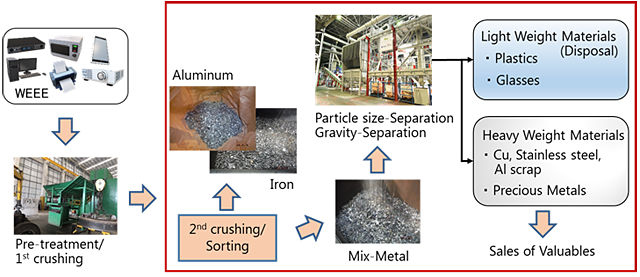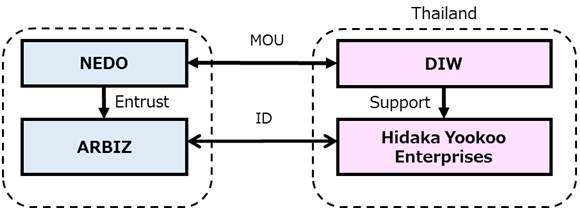Demonstration Project for an Energy-Saving Resource Circulation System to Utilize Electronic and Electrical Equipment Waste to Launch in Thailand
― Project aims to establish a recycle model among Asian nations ―
September 13, 2019
New Energy and Industrial Technology Development Organization (NEDO)
NEDO and the Department of Industrial Works of the Ministry of Industry of the Kingdom of Thailand (DIW) reached an agreement to jointly carry out a demonstration project for an energy-saving resource circulation system to utilize electronic and electrical equipment waste (WEEE) in Thailand. A memorandum of understanding for the project was concluded by NEDO and DIW on September 13, 2019.
The project aims to support the possible introduction of new guidelines and facilitate proper waste disposal in Thailand by introducing a consistent recycle system integrated with Japan’s advanced technologies to sort WEEE. Moreover, hazardous waste that cannot be treated in Thailand will be transported to Japan for recycling, thereby establishing an international resource circulation model among Asian nations in the future.

1.Overview
The amount of electronic and electrical equipment waste (WEEE) keeps rising with the improvement of living standards in Thailand. However, relevant laws to collect and dispose of WEEE are still underdeveloped. Improper treatment of WEEE has become an important issue as there are concerns that it may harm workers’ health and causes water and soil contamination.
Against this backdrop, NEDO and the Department of Industrial Works of the Ministry of Industry of the Kingdom of Thailand (DIW) reached an agreement to jointly carry out a demonstration project for an energy-saving resource circulation system to utilize WEEE in Bangkok and surrounding areas. A memorandum of understanding for the project was concluded by NEDO and DIW on September 13, 2019.
In the project, a consistent recycle system integrated with Japan’s advanced technologies to sort WEEE will be introduced. Efforts to facilitate proper waste disposal will also be made by providing support for the possible introduction of new guidelines in Thailand.
- Project information
- Project participant: ARBIZ Corporation
- Project implementation area: Hidaka Yookoo Gateway plant
-
 Fig. 2 Implementation structure of the project
Fig. 2 Implementation structure of the project
2.Outline of the project
As part of NEDO's Demonstration Project for Introducing an Energy-Saving Resource Circulation System, a feasibility study for the project and a subsequent stage-gate assessment were conducted in FY2017. Based on the results, the project will be carried out over a two-year period from FY2019 by focusing on the following points:
- (1) Introduction of a consistent recycle system
- A consistent recycle system will be introduced and the effectiveness of the system will be verified. The system integrated with Japan's advanced technologies is designed to collect WEEE, extract valuable resources, such as metals and resins, from WEEE and recycle them.
- (2) Support for the possible introduction of new guidelines
- With reference to Japan's Home Appliance Recycling Law and the Act on Promotion of Recycling of Small Waste Electrical and Electronic Equipment, joint activities will be carried out in order to help introduce guidelines suitable for Thailand's waste disposal. Moreover, an international resource circulation system will be developed by transporting hazardous waste that cannot be treated in Thailand to Japan with the aim of establishing a recycle model among Asian nations in the future.
3.For more information, please contact:
Environment Department, NEDO Tel:+81-44-520-5251 E-mail:3r-pj@ml.nedo.go.jp
